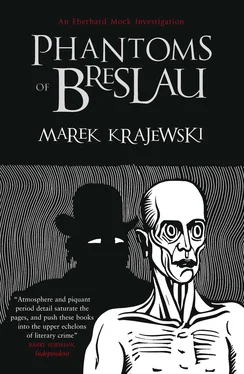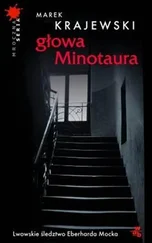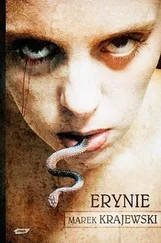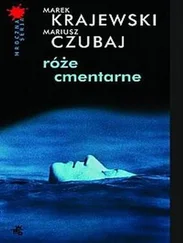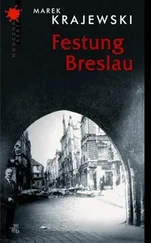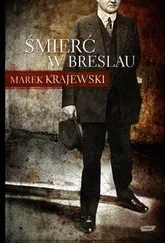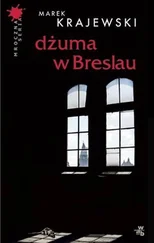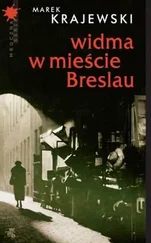Marek Krajewski - Phantoms of Breslau
Здесь есть возможность читать онлайн «Marek Krajewski - Phantoms of Breslau» весь текст электронной книги совершенно бесплатно (целиком полную версию без сокращений). В некоторых случаях можно слушать аудио, скачать через торрент в формате fb2 и присутствует краткое содержание. Жанр: Полицейский детектив, на английском языке. Описание произведения, (предисловие) а так же отзывы посетителей доступны на портале библиотеки ЛибКат.
- Название:Phantoms of Breslau
- Автор:
- Жанр:
- Год:неизвестен
- ISBN:нет данных
- Рейтинг книги:3 / 5. Голосов: 1
-
Избранное:Добавить в избранное
- Отзывы:
-
Ваша оценка:
- 60
- 1
- 2
- 3
- 4
- 5
Phantoms of Breslau: краткое содержание, описание и аннотация
Предлагаем к чтению аннотацию, описание, краткое содержание или предисловие (зависит от того, что написал сам автор книги «Phantoms of Breslau»). Если вы не нашли необходимую информацию о книге — напишите в комментариях, мы постараемся отыскать её.
Phantoms of Breslau — читать онлайн бесплатно полную книгу (весь текст) целиком
Ниже представлен текст книги, разбитый по страницам. Система сохранения места последней прочитанной страницы, позволяет с удобством читать онлайн бесплатно книгу «Phantoms of Breslau», без необходимости каждый раз заново искать на чём Вы остановились. Поставьте закладку, и сможете в любой момент перейти на страницу, на которой закончили чтение.
Интервал:
Закладка:
“You have the photograph, Smolorz?” Mock asked.
Smolorz looked drunk. He was swaying on his legs and grinning inanely. Without a word he pulled a large photograph from his briefcase and handed it to Erika. She looked at the girl in the photograph and said without prompting:
“Yes, I recognize her. She’s the one who came with her father to the apartment on Gartenstrasse.”
“Good,” Mock muttered, casting a critical eye at Smolorz. “And now to business. Are Muhlhaus’ men tailing Rossdeutscher? And where is my father?”
“At Wenzel-Hancke Hospital in the care of Doctor Ruhtgard,” Smolorz said, answering Mock’s questions in the order of their importance. “I don’t know how it stands with Rossdeutscher. There’s nothing about him in our archives. Nothing at all. Only his address. Carlowitz, Korsoallee 52. Here’s what I found out about him.” He handed Mock a piece of paper covered in even writing.
“Good, Smolorz,” Mock said, and his expression changed as he read on. “It appears our Rossdeutscher was accused by the Breslau Chamber of Medicine of practising the occult on his patients … He successfully defended himself against the accusations … And he is extremely well connected …”
Mock looked about him. Their party had drawn attention to itself. A newspaper vendor was staring at them, a beggar was pleading for a few marks.
“Get rid of them, Wirth.” Mock glanced at the short man in the bowler hat who with one gesture passed on the instructions to the giant standing next to him. The latter lurched towards the gawpers and they dispersed in clouds of steam.
“Smolorz,” Mock said, nodding towards Erika, “take Miss Kiesewalter to the apartment on Gartenstrasse. You’re to keep an eye on her until I send somebody to relieve you. And not a drop more today, understood? The rest of us” — he looked at Wirth — “are off. First to the hospital, and then to Carlowitz to pay Doctor Rossdeutscher a visit.”
He approached Erika and kissed her on the lips.
“Thank you for saying ‘Miss Kiesewalter’,” she whispered, returning the kiss, “and not simply ‘take her, Smolorz’. Thank you for not saying ‘her’ …”
“Did I really say that?” Mock smiled, and ran his rough hand across her pale cheek.
BRESLAU, THAT SAME SEPTEMBER 27TH, 1919
EIGHT O’CLOCK IN THE EVENING
Smolorz unlocked the door to the sailors’ apartment, stepped inside first and slammed the door in Erika’s face. He switched on all the lights and carefully inspected the rooms, and only then did he re-open the door. He took Erika by the elbow and led her in, bolting the door behind them, and sat down heavily at the kitchen table. He produced a bottle of Danzig Losos liqueur from his briefcase and poured a sizeable shot into a clean glass. As he sipped the burning liquid he watched Erika hang up her coat in the hall and then, dressed in a hat and a tight, cherry-red dress, enter the main room, bend over the bed and straighten the tangled sheets which nobody had changed for three weeks. Erika’s hips and the crumpled sheets from which, Smolorz presumed, her scent still emanated fuddled his thoughts for a moment. He remembered the Baroness writhing among the damp sheets and her husband standing next to the bed with an expression of curiosity, and then Baron von Bockenheim und Bielau sniffing some white powder and scattering acrid clouds all around himself with his coughing.
His next sip of Losos liqueur did not taste as good. He blamed this on the image of the polite, haughty Baron before his eyes. To make the drink taste better he turned his thoughts to the people who stirred warm feelings in him. What was his little Arthur doing now? Was he playing with his toy car? The liqueur was excellent. Was he kneeling on the kitchen floor in his thick trousers, reinforced on the backside with a leather patch, and pushing the little model Daimler along one of the well-polished floor-boards? Cleanliness in the kitchen made him think of his wife, Ursula Smolorz. There she was, kneeling on the kitchen floor scrubbing the smooth floorboards with Ergon powder. Her strong arms, her gently swaying breasts, her tearful, freckled face, her rending sobs as Smolorz, pushing her aside, slammed the door and made his way blind drunk towards the stately villa on Wagnerstrasse, where the Baroness was waiting for him in velvet sheets, clammy with sweat. Little Arthur had cried when his furious mother explained to him in a lowered voice that Papa didn’t love him any more, that he loved some trollop instead. “What’s a trollop, Mama?” “An evil viper, the devil in human flesh,” she had explained. Arthur Smolorz had run from his father when he wanted to pick him up, and had yelled to high heaven: “I don’t want you, go to the trollop!” The Criminal Sergeant reached for his bottle. He knew what worked best on a guilty conscience.
BRESLAU, THAT SAME SEPTEMBER 27TH, 1919
EIGHT O’CLOCK IN THE EVENING
Sister Hermina, on duty in the surgical ward at Wenzel-Hancke Hospital, replaced the telephone receiver. She was as aggravated as an angry wasp. Yet again that day she had received instructions from Doctor Ruhtgard, and yet again, in the confines of her heart, she expressed her disapproval. What was it supposed to mean? Since when was she receiving instructions from a doctor in another department? She decided to complain to her immediate superior, Doctor Karl Heintze, Head of Surgery. What impudence! This Ruhtgard, as a dermatologist, ought to restrict himself to his rotting prostitutes and his lustful middle-class men devoured by tertiary syphilis! Sister Hermina chased away these bad thoughts, incompatible as they were with her gentle, understanding nature consolidated by years in the service of others. Through the glazed panel of the duty room, she watched as two orderlies pushed a wheelchair in which pot-bellied Herr Karl Hadamitzky, dazed with morphine, travelled towards the operating theatre, to encounter the drainage tube and scalpel that were destined to cut away the cancerous growth from his kidney.
The wheelchair was followed by a man who was running. His jacket was unbuttoned and he was fanning himself with a bowler hat. Sister Hermina stared at him for a while, her attention drawn to his sallow skin darkened by a considerable five-o’clock shadow, his broad shoulders and his black, wavy hair. He passed her duty room without a word of explanation as to who he was or what he was doing there. That was too much.
“Hey, my good man!” she shouted in a loud, almost masculine voice. “Are you visiting one of our patients? You have to report to me first!”
“Eberhard Mock,” the man said in a deep, hoarse voice. “I am indeed. I’m going to visit my father, Willibald Mock.”
Saying this he donned his bowler hat and then removed it, bowing to Sister Hermina. This greeting was as ironic as it was courteous. Without waiting for her permission, and disregarding any reaction she may have had, he walked briskly down the corridor.
“Mock Willibald, Mock Willibald,” the irate nurse repeated, running her finger down the column of names. A moment later her finger stopped short. “Ah, he’s the one who found himself on our ward on Doctor Ruhtgard’s instructions. He’s the patient requiring special care! What’s that supposed to mean, ‘special care’? They all require special care! Not only the elderly Willibald Mock! I’ll soon put a stop to this!”
Sister Hermina reached for the telephone and dialled Professor Heintze’s home number.
“Doctor Heintze’s residence,” said a well-spoken male voice at the other end of the receiver.
“It’s Sister Hermina from Wenzel-Hancke Municipal Hospital. May I speak to the doctor, please?”
Читать дальшеИнтервал:
Закладка:
Похожие книги на «Phantoms of Breslau»
Представляем Вашему вниманию похожие книги на «Phantoms of Breslau» списком для выбора. Мы отобрали схожую по названию и смыслу литературу в надежде предоставить читателям больше вариантов отыскать новые, интересные, ещё непрочитанные произведения.
Обсуждение, отзывы о книге «Phantoms of Breslau» и просто собственные мнения читателей. Оставьте ваши комментарии, напишите, что Вы думаете о произведении, его смысле или главных героях. Укажите что конкретно понравилось, а что нет, и почему Вы так считаете.
